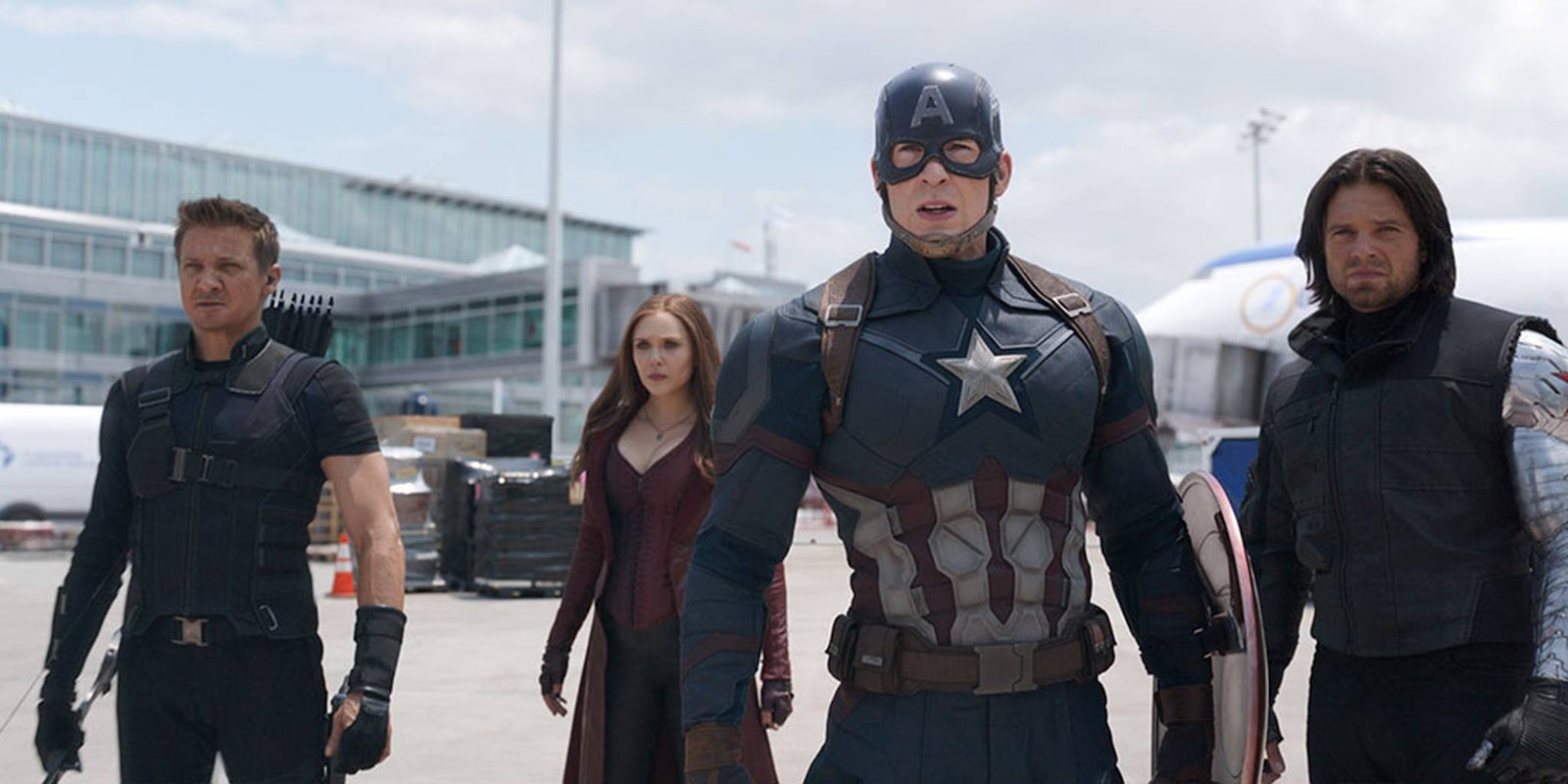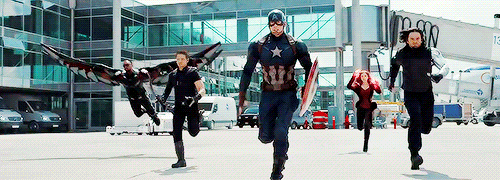The Democratic and Republican candidates for president have spent endless hours debating issues around national security, the economy, and healthcare. But there’s one more question voters should consider before they head to the polls on Tuesday: Where do the candidates stand on the Superhero Registration Act?
It’s a topic that’ll become very relevant to millions of Marvel fans when Captain America: Civil War debuts on May 6.
Civil War sees Captain America and Iron Man clash over superhero registration, which is precipitated by the collateral damage caused by various Avengers showdowns with homegrown bad guys and alien invaders. Iron Man wants superheroes to be regulated by a governing body, while Cap puts a higher value on personal freedom.
Fans have interpreted this conflict using a variety of analogies, from the gun control debate to Donald Trump‘s push to create a database of Muslim citizens. But while superhero registration doesn’t map neatly onto any specific issue, its divisiveness is universally understood—especially in an election year.
So, in the spirit of public service, we contacted every major presidential campaign and asked where their candidate stood on the superhero registration issue. Only one gave us a definitive answer: Bernie Sanders.
Yes, we can now reveal that the Bernie Sanders campaign is #TeamCap, endorsing Captain America in this year’s fictional Marvel showdown.
On its surface, the “correct” answer to our question was fairly predictable. Captain America is an avatar of patriotism, and he’s the protagonist of the movie. The charming and morally ambiguous Tony Stark has more of a cool factor, but for a presidential candidate, the choice seems clear: Captain America.
Except actually, it’s not.
The battle is over, but the war is just beginning. #TeamCap pic.twitter.com/7O2QwJpYmU
— Captain America (@CaptainAmerica) February 8, 2016
It’s tempting to see Civil War through the lens of partisan divides. Instead of just being a flag-waving action hero, the Marvel Cinematic Universe‘s version of Captain America is often interpreted as a politically progressive leader, a son of Irish immigrants who grew up in poverty and went on to lead the U.S. army’s first racially integrated unit. Thanks to being frozen in ice for 70 years, he missed out on Cold War and the social conservatism of the 1950s. And to top it off, his most consistent character traits are a distrust for authority and a passion for fighting against inequality.
Meanwhile Tony Stark is basically the embodiment of American capitalism, a billionaire weapons manufacturer who once announced that he had “successfully privatized world peace.” He represents the kind of wealth and clout that unavoidably influences the political landscape.
One of the central themes of Stark’s character arc is accountability, or lack thereof. His origin story begins with him learning that Stark Industries weapons are being sold to terrorists, a discovery that completely changes his attitude as a businessman and inventor. But by Avengers: Age of Ultron he had come full circle. By creating Ultron and a fleet of robot drones to protect the world from alien attacks, he almost doomed the planet to destruction—yet the film ends with him funding a new generation of Avengers, apparently unpunished for almost starting World War III. This immense power and lack of accountability makes him a suspicious figure to Cap’s “side with the little guy” mindset.
The thing that makes Civil War such an enticing political drama is the way it combines the two competing ideologies with each character’s emotional arc. Stark is technically the antagonist, but his viewpoint is perfectly comprehensible—which is why Marvel’s #TeamCap vs. #TeamIronMan marketing campaign works so well. It’s easy to understand why he might feel guilty after the mass destruction of Age of Ultron, and he has a consistent habit of making bad decisions while trying to keep people safe. Tie in the post-traumatic stress he and millions of other people feel following these massively destructive and decidedly superhuman battles, and it’s easy to see how fear could roll into a political movement aimed at regaining some kind of control.
Stark has come a long way since the first Iron Man film. His character development roughly follows the mold of an enfant terrible tech genius who began as an eccentric outsider, but has matured into a member of the establishment. Meanwhile Rogers went in the opposite direction, beginning as a patriotic army recruit, and gradually developing a distrust of government oversight. The real tipping point was in Captain America: The Winter Soldier, when he and Black Widow incapacitated the corrupt spy agency S.H.I.E.L.D.—which at the time was performing a less official version of Civil War‘s superhero regulation.
As with Hogwarts house affiliations a la Harry Potter, the #TeamCap vs. #TeamIronMan debate leaves plenty of room for armchair psychology and philosophy.
We were especially disappointed not to hear back from Ted Cruz (who loves Star Wars and superheroes) or Marco Rubio (whose online store includes Captain America-inspired shirts), but c’est la vie. You will have to speculate for yourselves on where the other candidates stand in the Civil War divide.
The next #CaptainAmerica is about the govt regulation of superbeings. Our ❤️ of politics and superheroes collide again. #newamericancentury
— Team Marco (@TeamMarco) May 7, 2015
As for Bernie Sanders, his campaign’s Captain America endorsement is more or less what we expected. Like Cap, Sanders was born in Brooklyn and displays a vocal dislike for inequality. He seems to come from a bygone era of American politics (although perhaps not directly from the New Deal like Steve Rogers), and he’s both an anti-establishment figure and a mainstream political leader.
We kind of doubt that he’ll actually get to see Civil War, though. During one campaign stop he said he’s only had time to watch two movies, and one of them was Wall Street drama The Big Short—not exactly summer blockbuster material.
Photo via Disney



